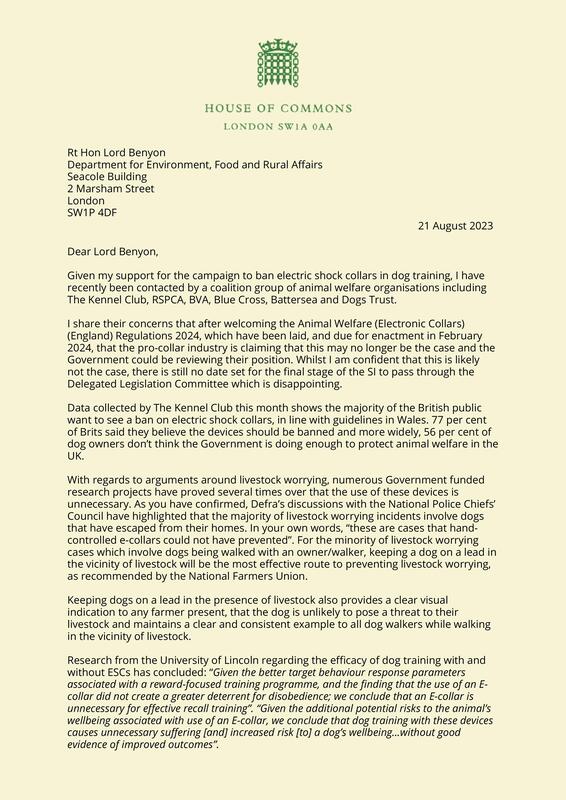|
On the 21st August 2023 I wrote to the Rt Hon Lord Beynon at the Department for Environment, Food and Rural Affairs regarding my deep concern over the potential reversal of the ban on electric shock collars in dog training. You can read my letter in full below: Dear Lord Benyon,
Given my support for the campaign to ban electric shock collars in dog training, I have recently been contacted by a coalition group of animal welfare organisations including The Kennel Club, RSPCA, BVA, Blue Cross, Battersea and Dogs Trust. I share their concerns that after welcoming the Animal Welfare (Electronic Collars) (England) Regulations 2024, which have been laid, and due for enactment in February 2024, that the pro-collar industry is claiming that this may no longer be the case and the Government could be reviewing their position. Whilst I am confident that this is likely not the case, there is still no date set for the final stage of the SI to pass through the Delegated Legislation Committee which is disappointing. Data collected by The Kennel Club this month shows the majority of the British public want to see a ban on electric shock collars, in line with guidelines in Wales. 77 per cent of Brits said they believe the devices should be banned and more widely, 56 per cent of dog owners don’t think the Government is doing enough to protect animal welfare in the UK. With regards to arguments around livestock worrying, numerous Government funded research projects have proved several times over that the use of these devices is unnecessary. As you have confirmed, Defra’s discussions with the National Police Chiefs’ Council have highlighted that the majority of livestock worrying incidents involve dogs that have escaped from their homes. In your own words, “these are cases that hand-controlled e-collars could not have prevented”. For the minority of livestock worrying cases which involve dogs being walked with an owner/walker, keeping a dog on a lead in the vicinity of livestock will be the most effective route to preventing livestock worrying, as recommended by the National Farmers Union. Keeping dogs on a lead in the presence of livestock also provides a clear visual indication to any farmer present, that the dog is unlikely to pose a threat to their livestock and maintains a clear and consistent example to all dog walkers while walking in the vicinity of livestock. Research from the University of Lincoln regarding the efficacy of dog training with and without ESCs has concluded: “Given the better target behaviour response parameters associated with a reward-focused training programme, and the finding that the use of an E-collar did not create a greater deterrent for disobedience; we conclude that an E-collar is unnecessary for effective recall training”. “Given the additional potential risks to the animal’s wellbeing associated with use of an E-collar, we conclude that dog training with these devices causes unnecessary suffering [and] increased risk [to] a dog’s wellbeing…without good evidence of improved outcomes”. I would urge you to keep good on the promise to ban these devices. This would be a tremendous step forward for dog welfare and to renege on this commitment at this time would be incredibly disappointing, especially following the recent abandonment of the widely supported Kept Animals Bill. Yours sincerely, Tonia Antoniazzi MP Member of Parliament for Gower Comments are closed.
|
News Archive
May 2024
Categories
All
|


